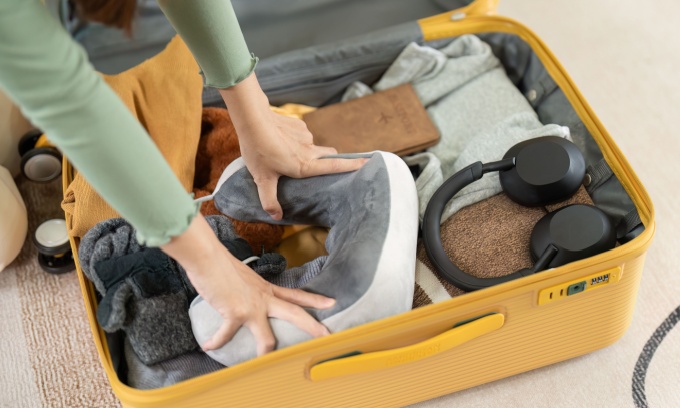Australians can’t get enough of travel, from exploring our own vast country to venturing overseas for new experiences. All too often we leave packing till the last minute and forget to take items that would make our stay away from home a lot more comfortable. So here’s our list of essentials to pack for any trip.
Related: Travelling overseas checklist
1. Sensible clothing and footwear
If you’re heading to Iceland in winter, shorts and thongs are simply not going to cut it. It’s important to tailor your travelling wardrobe to the climate and conditions of your destination. Choose clothes that will mix ‘n’ match well with others in your suitcase, are comfortable and are still going to look okay when they’re pulled out of the bottom of a backpack or suitcase.
This goes for shoes as well. A trip overseas is not the time to ‘break-in’ new shoes – stick to comfy sports shoes or hiking boots, a better dress pair, and thongs. You can’t afford to take clothes and shoes you will only wear once during the trip. Some other essentials to pack are pyjamas or sleepwear, a hat, a rain jacket and a swimsuit (if you plan on swimming or laying by the pool) or warm clothes (if you’re venturing someplace cold).
It’s also important to be respectful of local traditions. In some Middle Eastern countries, particularly more conservative ones like Saudi Arabia and Iran, local customs and laws do regulate clothing. Men and women might be expected to wear long pants and avoid overly casual attire in certain public and/or religious places. Women may also be legally required to cover their head or shoulders in certain locations, particularly religious ones. Some European countries, like Italy, may have similar standards for religious places, such as the Vatican. Information about local customs is often available on the Australian Government’s Smartraveller website.
2. A laundry bag
Living out of a suitcase works best when you’re organised. That means putting your mud-stained jumper and smelly socks in a laundry bag away from the rest of your nice, clean clothes. It doesn’t have to be a fancy laundry bag; old shopping bags do the job just as well and don’t take up much valuable space. Be aware that if you store anything wet in there for too long, it’s going to smell pretty bad – so find a local laundromat as soon as you can!
3. Travel Insurance
Unfortunately, travelling doesn’t always go to plan. In situations where you become injured or sick, travel insurance can often stop you from incurring significant out of pocket costs. Smartraveller strongly suggests having a travel insurance policy in place before you depart on your holiday.
Medical cover is one of the main reasons to take out travel insurance, as the Australian Government will not cover your overseas medical costs, including medical evacuation. Other important things that travel insurance can cover are the loss of baggage and travel documents, cancellation of flights and accommodation and legal liability. As with any insurance policy, you won’t realise its true value until you have to use it. In the meantime, it can give you some peace of mind.
4. Medication – Prescription and over the counter
Outside Australia you may find common medications are unavailable or restricted. Pack all prescription medicines that you may need, including a letter from your doctor for specialist medicine. It can also be a good idea to carry painkillers, cold and flu tablets, medication to stop diarrhoea, motion sickness/nausea medication, antibacterial cream, hand sanitiser and bandaids.
Do be aware though that some medications available over the counter or by prescription in Australia (such as codeine) are illegal or considered controlled substances in other countries. So it’s really important to read the travel advice provided by the government for the country of your choice, before you head off. It’s also a good idea to travel with a letter from your doctor detailing any medicine that you are carrying. The letter should state:
- what the medicine is,
- how much you’ll be taking,
- and that the medicine is for your personal use or the personal use of someone with you (for example, a child).
More information on travelling with medication is available from the Department of Health and Aged Care’s Therapeutic Goods Administration.
5. Toiletries
Aside from the usual deodorant and toothpaste, think outside the box. What about a copy of your glasses prescription? If a monkey steals your specs while you’re at an Asian temple, you’ll have trouble doing any more sightseeing until you get replacement glasses. Sunscreen and aloe vera is also a must if you’re planning on spending time outside in the sun. In some countries, insects carry certain diseases like Dengue and Malaria, so insect repellant can be very important. Be mindful too, that in some countries supplies of feminine hygiene products and contraceptives, including condoms, can be unreliable or unavailable. Finally, depending on where you’re going, consider taking toilet paper or at least wet or baby wipes for hand cleaning.
6. Emergency funds
It can be a good idea to carry some currency for the country you’re heading to. Although most of the world has adopted the use of debit/credit cards, you never know when you’ll need cash, until you need it. Some things that we take for granted in Australia, such as free public toilets, often cost money to use in other countries. If you plan on washing your clothes while abroad, many automated laundromats only take cash. Transport, such as taxis, and other business owners may prefer/only take cash for their goods and services.
Using cash can also help you budget for a short trip, especially when you have an envelope of cash for each day. Assuming you bought your cash in the right currencies before you left, you don’t need to worry about currency conversion fees, ATM fees or exchange rates. Having cash pre-organised also means you won’t have to search airports for currency exchanges, where you may have to pay more in fees. That being said, it’s important to be wary of pickpockets when withdrawing or using cash. Some travellers find using a money belt, which resides underneath the shirt, can add security to their funds and bring some peace of mind.
7. Spare credit/debit card
Don’t put all your eggs in one basket, or in this case, your wallet. Don’t pack just one travel credit/debit card. If you lose it and you haven’t got it saved in a digital wallet, you’ve got no backup and that could leave you in a tricky situation. Having a spare is usually a good move.
Travel money cards are also a great option because they give you the convenience of cash but with a greater level of security. They allow you to convert your money into several different currencies to store on the card and use overseas. They make overseas purchases convenient and secure, but may have conversion, international transaction and ATM fees. You could also look at the financial institutions who offer debit cards for international use, usually with low or no international transaction fees, international ATM fees (for ATMs within and outside of the provider’s network) and account keeping or annual fees.
8. A universal power adapter and travel sim card
Different countries have different power circuits so being prepared with the right electrical adapter or plug converter will keep all of your electrical items charged. You can often buy universal adaptors from travel stores or online. Some are multifunctional and can be used all over the world. If you need a lot of ports, having a double adaptor or using a power board could help charge two to four devices at once. You can also take advantage of charging devices at airports and cafes, if you see you’re running low. Portable power banks/chargers are also very useful if you find your devices are using a lot of power when you’re out and about. Don’t forget power cords and chargers for things like mobile phones and laptops as well.
Staying connected to your travel companions, as well as those at home, can be important when travelling. That’s why having a sim card that functions while you’re overseas is something you should consider. Data roaming overseas, however, can be very expensive when using your regular Australian carrier. That’s why enquiring with your sim card provider about their international roaming options before you leave the country can potentially save you from a large phone bill upon your return. If your provider doesn’t offer an international roaming option that suits your needs, Canstar Blue compares travel sim and roaming packs from their database of providers.
9. Documentation and itinerary
Before you head off on your overseas trip, you should make sure that your passport is still valid. Your passport should be valid for at least six months before entering another country, but many travel guides recommend it being valid for six months after arriving back home too, to ensure that you don’t get stuck overseas. Make colour photocopies of your passport, driver’s licence, travel insurance and take along spare passport photos. You could be asked for ID by relevant authorities anywhere and if you lose your main documentation, you may find it hard to convince them that you are who you say you are. In the case that you do lose your passport, it is possible to obtain an emergency replacement, although this can be costly.
Apart from passport and visas, you’ll also need a document for important contact information, such as for credit card providers, travel insurance hotlines, Australian Embassy details and family contacts. Plus your tickets and itinerary (airline, train, bus, accommodation bookings, tours etc).
10. Something to keep you entertained
If you’re in for a long-distance flight or other method of travel, take something to keep you occupied. It could be that book you’ve been meaning to read, a playlist of your favourite music, a game you love playing or even an old fashioned deck of cards. Anything to whittle away the time or block out that annoying person in the seat next to you!
Everyone wants to make the most of their overseas travels, but it’s important that you do so without incurring any damages to your bank account. If you’ve taken out travel insurance and packed a travel and/or debit card, you may have some peace of mind that your finances will be in good shape upon your return.
Compare credit cards with complimentary travel insurance
Can travel insurance cover my belongings on my trip?
Generally a travel insurance policy will cover your belongings, like your luggage, passport and other items, if they are lost or stolen. It may also cover lost credit cards and cash, as well as fees for the replacement of travel documents. There will often be limits and exclusions that apply, so it’s important to check your policy’s Product Disclosure Statement (PDS) to make sure that your level of cover can sufficiently cover the possessions you plan on taking.
Cover image source: Natee Meepian/Shutterstock.com








